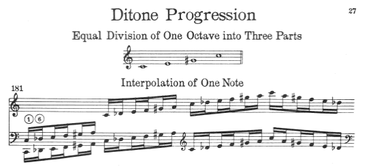|
In Banff in 2010 I began to practice piano using unusual scales from Nicolas Slonimsky's Thesaurus of Scales and Musical Patterns.
This amazing book exhaustively catalogues the ways a person can get up and down an octave. I would practice a scale each day, analyzing its leaps and steps, choosing an accompanying chord to play in my left hand, then playing the scale in four octaves through twelve keys—among other arrangements. (Practicing in "thirds" or "fourths," etc.) I came back to scales in general as a way of cultivating a confident touch, but I ended up getting something subtler from Slonimsky. These scales became pathways, possibilities for getting from place to place. They transformed not just my physical sense of the piano but also its visual dimensions.
Around the same time, I began a practice of daily morning improvisations. In Banff I recorded dozens of these, and later transcribed and edited several of them into standalone compositions, most directly the Piano Inventions. My approach in improvisation was guided by Slonimsky's geometric constructions. Last fall I started recording improvisations again, and I've begun to shape those recordings into a second book of Piano Inventions. Usually they aren't long, say three to five minutes, occasionally stretching towards ten. I'm interested in ideas of boundedness and identity: what makes this little piece itself? How quickly can I establish an identity, and what musical events can follow that maintain, stretch, or break that identity? Along the way I end up bumping into one of my old albatrosses, the notion of musical "development." As a student composer I often wrote pieces that had lots of ideas with few connections between them, making "more development!" an easy prescription. I grated against it partially because that's what you do with things your teachers tell you, partially out of a genuine if nascent curiosity regarding alternative notions of musical time, and partially because I saw that the lesson reflected a true limitation in my musical grounding. I didn't understand how to "develop" an idea, and it didn't come naturally. "Development" still becomes a very mystical concept the second I begin to interrogate it, but generally as my listening has grown I've come to accept that one event can come from another, and that there are purely musical ways of doing this that can be intuitive and characteristic rather than historically or stylistically labored. (I think I began to understand development for the first time when a teacher told me that repetition is the simplest form of it. We hear an idea differently the second time; therefore, the idea has been developed. In this broad sense, development might be any way in which the music recognizes and accepts the fact that time is passing through and around it.) Anyway, with the latest improvisations I'm still less concerned with developing material in the traditional manner because I'm still, on some gut level, unable to accept of the idea of "material" (remember, friends: it's only a metaphor); but nonetheless I can admit that the first thing I play sets up an atmosphere, creates a place, and the work is understanding the shape and color of that place, keeping the listener there long enough for it to be appreciated, and going elsewhere only decisively and carefully. My latest improvisation project is the Five Epilogues for Rhodes piano. I recorded these five improvisations the same day in May and set them against the same five minutes of environmental sound recorded out the door of my studio. The drone enters at the same moment in each, two minutes thirty seconds, and the environmental sound continues after each improvisation, in its own time, concludes. (Diegetic, or non-diegetic?) A composer whose work I admire once referred to a different piece of mine as "beautifully contained." This remains one of my favorite compliments.
0 Comments
Your comment will be posted after it is approved.
Leave a Reply. |
A Selection• Gone Walkabout
• Migration • Music as Drama • Crossroads II • 10 Best of 2014 • January: Wyoming and the Open • February: New Mexico and the Holes • Coming Up • Notes on The Accounts • Crossroad Blues • Labyrinths Archives
October 2020
|

 RSS Feed
RSS Feed